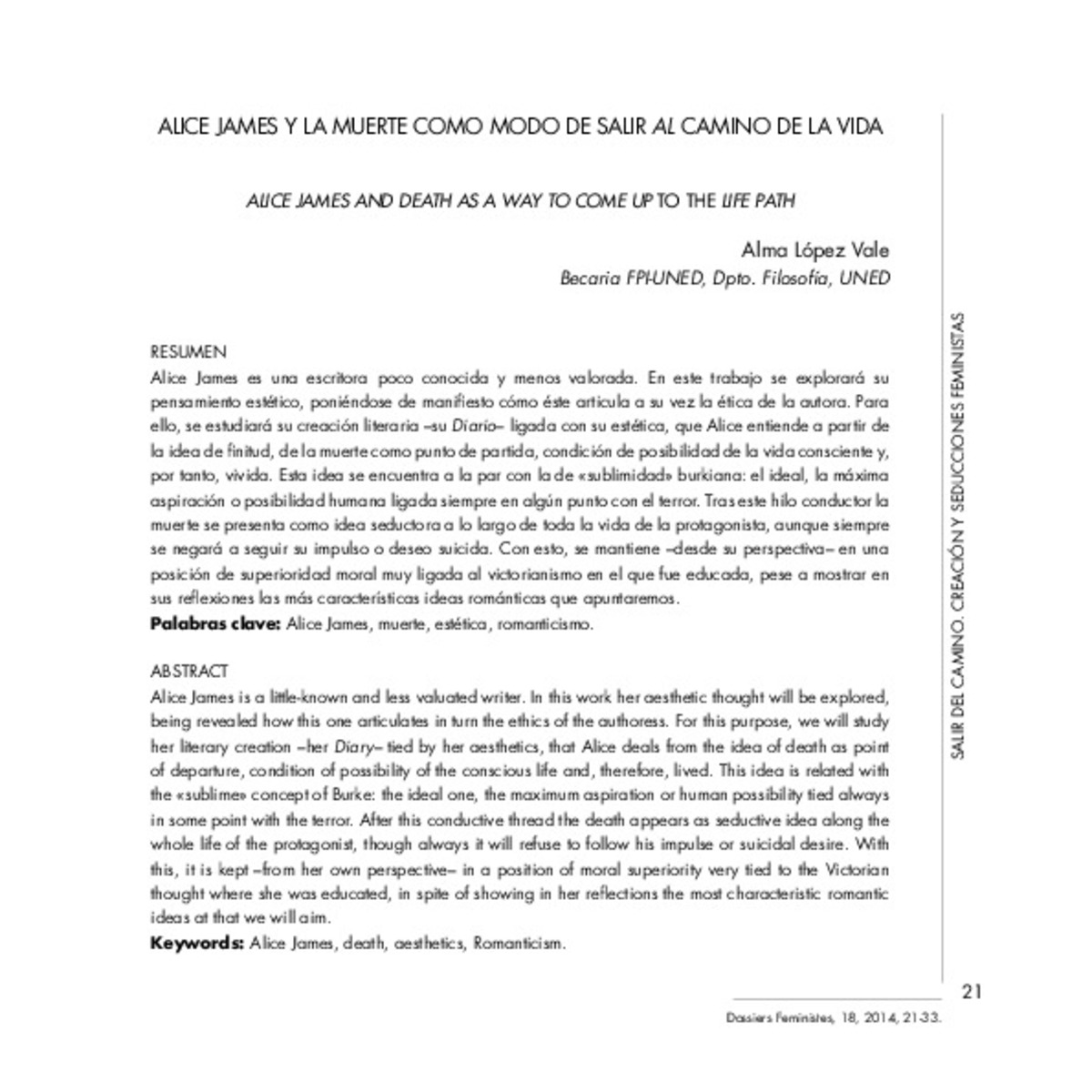Mostrar el registro sencillo del ítem
ALICE JAMES Y LA MUERTE COMO MODO DE SALIR AL CAMINO DE LA VIDA
| dc.contributor.author | López Vale, Alma | |
| dc.date.accessioned | 2015-11-27T08:19:10Z | |
| dc.date.available | 2015-11-27T08:19:10Z | |
| dc.date.issued | 2014 | |
| dc.identifier.issn | 1139-1219 | |
| dc.identifier.issn | 2340-4930 | |
| dc.identifier.uri | http://hdl.handle.net/10234/141607 | |
| dc.description.abstract | Alice James es una escritora poco conocida y menos valorada. En este trabajo se explorará su pensamiento estético, poniéndose de manifiesto cómo éste articula a su vez la ética de la autora. Para ello, se estudiará su creación literaria –su Diario– ligada con su estética, que Alice entiende a partir de la idea de finitud, de la muerte como punto de partida, condición de posibilidad de la vida consciente y, por tanto, vivida. Esta idea se encuentra a la par con la de «sublimidad» burkiana: el ideal, la máxima aspiración o posibilidad humana ligada siempre en algún punto con el terror. Tras este hilo conductor la muerte se presenta como idea seductora a lo largo de toda la vida de la protagonista, aunque siempre se negará a seguir su impulso o deseo suicida. Con esto, se mantiene –desde su perspectiva– en una posición de superioridad moral muy ligada al victorianismo en el que fue educada, pese a mostrar en sus reflexiones las más características ideas románticas que apuntaremos. | ca_CA |
| dc.description.abstract | Alice James is a little-known and less valuated writer. In this work her aesthetic thought will be explored, being revealed how this one articulates in turn the ethics of the authoress. For this purpose, we will study her literary creation –her Diary– tied by her aesthetics, that Alice deals from the idea of death as point of departure, condition of possibility of the conscious life and, therefore, lived. This idea is related with the «sublime» concept of Burke: the ideal one, the maximum aspiration or human possibility tied always in some point with the terror. After this conductive thread the death appears as seductive idea along the whole life of the protagonist, though always it will refuse to follow his impulse or suicidal desire. With this, it is kept –from her own perspective– in a position of moral superiority very tied to the Victorian thought where she was educated, in spite of showing in her reflections the most characteristic romantic ideas at that we will aim. | ca_CA |
| dc.format.mimetype | application/pdf | ca_CA |
| dc.language.iso | spa | ca_CA |
| dc.publisher | Universitat Jaume I. Institut Universitari d'Estudis Feministes i de Gènere | ca_CA |
| dc.relation.isPartOf | Dossiers Feministes, núm.18 | ca_CA |
| dc.rights.uri | http://rightsstatements.org/vocab/CNE/1.0/ | * |
| dc.subject | Alice James | ca_CA |
| dc.subject | muerte | ca_CA |
| dc.subject | estética | ca_CA |
| dc.subject | romanticismo | ca_CA |
| dc.subject | Alice James | ca_CA |
| dc.subject | death | ca_CA |
| dc.subject | aesthetics | ca_CA |
| dc.subject | romanticism | ca_CA |
| dc.subject.other | Dones -- Revistes | ca_CA |
| dc.subject.other | Feminisme -- Revistes | ca_CA |
| dc.title | ALICE JAMES Y LA MUERTE COMO MODO DE SALIR AL CAMINO DE LA VIDA | ca_CA |
| dc.title.alternative | ALICE JAMES AND DEATH AS A WAY TO COME UP TO THE LIFE PATH | ca_CA |
| dc.type | info:eu-repo/semantics/article | ca_CA |
| dc.rights.accessRights | info:eu-repo/semantics/openAccess | ca_CA |
| dc.relation.publisherVersion | http://www.e-revistes.uji.es/index.php/dossiers/article/view/1223/1243 | ca_CA |







